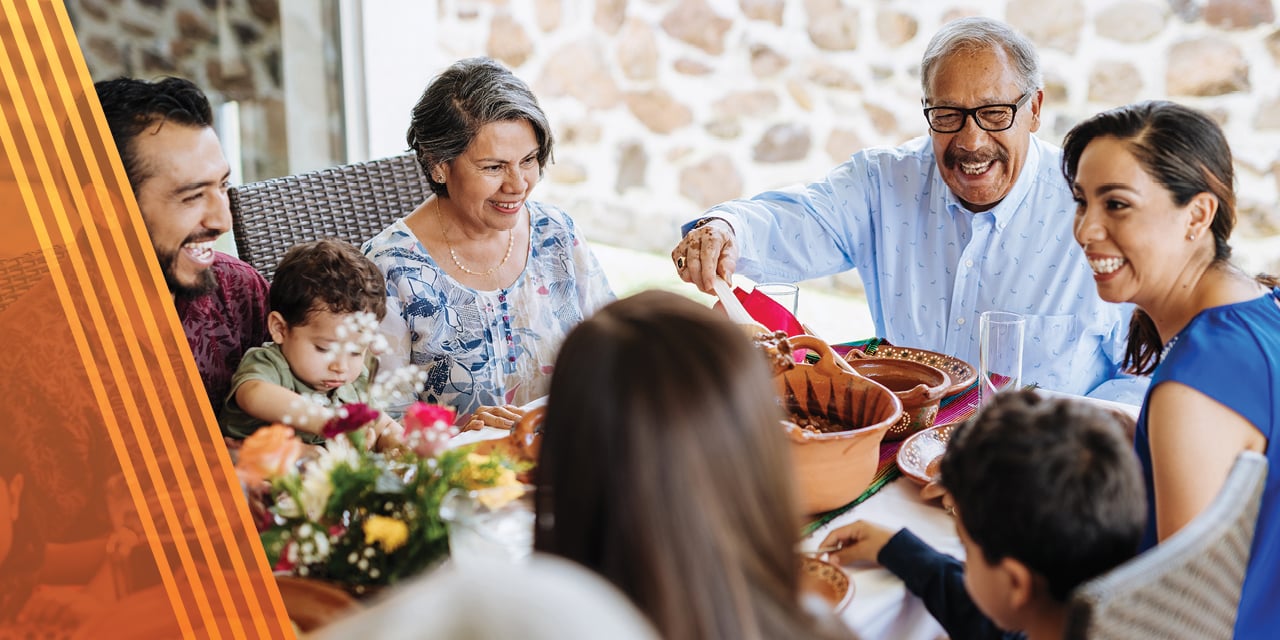
October Wealth Strategies
Generational Wealth and Planning Your Legacy
Most holidays allow families to sit around the dinner table and enjoy one another’s company. With that, they bring opportunities for families to have conversations around finances that, although potentially uncomfortable, are necessary to have. In our October Wealth Strategies webinar, our experts share how to make those discussions less tense and more productive.
Defining Your Family’s Charitable Legacy
When it comes to family philanthropy, an essential question to be answered is, “What is your family’s legacy?” Every family is different, but to define the legacy for your unique family, consider these ideas:
- What are your core values?
- What values do you want to pass onto your children?
- What values do you want to prioritize expressing to others?
- How do you honor the generations who made sacrifices for the future of the family?
When a family’s legacy is well-known and well-defined, passing that legacy onto the younger generations is the key to determining its future. To do this, Baird Trust’s Charitable Solutions Strategist Jonathan Raymon suggests starting a conversation centered around what everyone is thankful for – a simple topic to get even younger kids involved. From there, a discussion around family morals and values can spark, leading to an explanation on how your family has chosen to show gratitude. For many, showing gratitude includes giving charitable donations, but to include the younger generation in this activity, you may consider giving children a choice on how they want to contribute to a charity. Allowing younger people to actively volunteer for an organization, along with or instead of donating, may also drive the point home on just how important charitable giving is to your family.
Of course, by doing this, the hope is that your children and grandchildren will eventually continue your legacy of contributing to charitable organizations after your passing. Families can start this trend by utilizing donor-advised funds, where multiple family members can contribute and the growth in the account is tax-free. If you are the owner of the account, consider having fellow family members decide where some of the funds might be donated. To make the most of your donations, Jonathan also recommended using qualified charitable distributions from traditional IRAs. This way, the account owner can take a distribution from an IRA without incurring tax on up to $100,000 – plus, the money goes directly into the hands of the charity.
Understanding Your Legacy Through Storytelling
Another great way to kick off a conversation about family legacy is through storytelling. Wealth Strategist Linda Grant-Smith explained that though there may be generational gaps at the dinner table, storytelling is something that can bring everyone together. The older generations have years of knowledge and are usually eager to share their stories with those who are the future of their family.
Consider asking elder family members to share stories or accomplishments they’re proud of so that the larger family can understand their legacy. In the webinar, Linda shared a story regarding the dedication and effort it took from her grandparents to achieve the life they yearned so much for. Ultimately, her grandparents’ hard work played a huge role in getting her to where she is today. Linda encourages elders to let their important stories be heard so that families can internalize them and have a new appreciation for their legacy and the values that created it, which can serve future generations well.
Bridging the Generational Divide
While storytelling gives young people the chance to start conversations with their elders, Manager of Wealth Planning Associates C.J. Jessup gives advice on how the older generations within a family can communicate effectively with their younger counterparts. To set the stage, C.J. provided facts to describe the contrast between the economy when baby boomers were in their twenties and thirties, versus the economy now:
- Since 1980, the cost of college has increased by more than 160%, but the earnings of young people have only increased by about 20%.
- 40% of people between 22 and 32 have less than $5,000 saved in their 401(k), which leaves them falling behind on saving for a secure retirement.
- 50% of millennials delayed buying a home due to financial constraints, compared to 23% of baby boomers.
As millennials and Generation Zers grow up facing tough economic times, the financial challenges that come with them aren’t always acknowledged. Younger adults still feel the desire to get married, purchase a home and start a family, and many feel embarrassed that they haven’t achieved these things yet. So, to open the door to a comfortable and engaging conversation, C.J. recommends asking them about their situation instead of telling them where you think they should be. Open-ended questions from a caring family member may turn into to a deep conversation regarding the roadblocks that are preventing a young adult from reaching their full potential.
Sharing Estate Planning Documents
While having conversations about estate planning is important, they can’t be had without the documents to support them. Here is a list of important documents for planning an estate:
- A power of attorney for financial affairs
- A power of attorney for healthcare
- A healthcare directive (living will)
- A will
- A revocable (living) trust
These documents are critical for family members who are appointed to roles such as power of attorney, executor of will or successor trustee. Because of this, it is essential to ensure that everyone who needs to know where these documents are has access to them. Without this knowledge, added stress and worry can come with an already challenging time that occurs when a family member passes away, or is facing serious health concerns.
Director of Baird Family Wealth Jaleigh White also spoke on how to start up conversations regarding someone’s estate plan. Since these discussions can be challenging for everyone involved, a safe way to address them is to use analogies, such as, “How am I going to handle your estate plan without a roadmap on how you want it to be done?” Hopefully, by sensitively using this tactic to start the conversation, you can eventually talk through what their major health and aging concerns might be.
Jaleigh concluded her presentation with the subject of cybersecurity and how important it is to help older adults with it. Teaching older generations about potential bad actors and scams could likely save them a lot of heartache. Along with this, a great tip is to have your loved one consider a password manager. By safely storing passwords in one location, you are mitigating potential problems that can arise once action needs to be taken on an estate.
To learn more, check out October’s Wealth Strategies video on generational wealth and estate planning. Your Baird Financial Advisor is also here to discuss the details of your unique situation. Our entire series of Wealth Strategies webinars is available online.
This information has been developed by a member of Baird Wealth Solutions Group, a team of wealth management specialists who provide support to Baird Financial Advisor teams. The information offered is provided to you for informational purposes only. Robert W. Baird & Co. Incorporated is not a legal or tax services provider and you are strongly encouraged to seek the advice of the appropriate professional advisors before taking any action. The information reflected on this page are Baird expert opinions today and are subject to change. The information provided here has not taken into consideration the investment goals or needs of any specific investor and investors should not make any investment decisions based solely on this information. Past performance is not a guarantee of future results. All investments have some level of risk, and investors have different time horizons, goals and risk tolerances, so speak to your Baird Financial Advisor before taking action.


